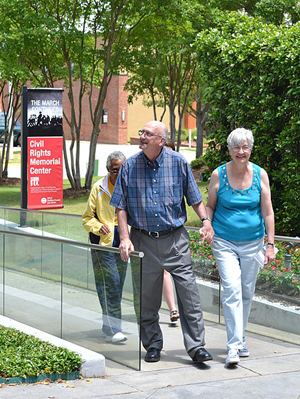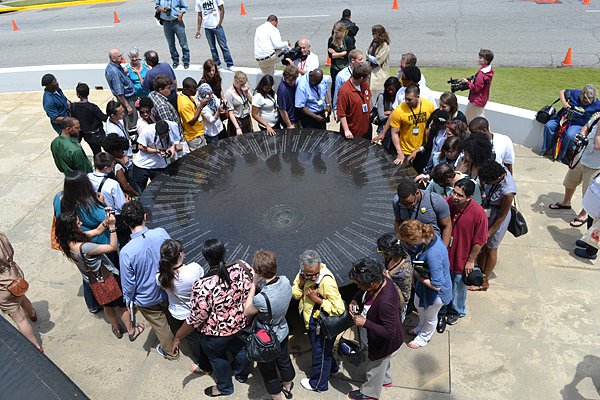Next Generation of Freedom Riders Committed to Justice
Fifty years ago, the Freedom Riders arrived in Montgomery, Ala., and were viciously beaten by a violent mob because they dared test federal laws designed to end segregation at bus terminals. On Saturday, a bus of college students retracing the steps of the Freedom Riders arrived in Montgomery, where they visited the Civil Rights Memorial Center.
Fifty years ago, the Freedom Riders arrived in Montgomery, Ala., and were viciously beaten by a violent mob. In the eyes of that mob, the young people aboard the buses had committed an unforgivable act: They dared test federal laws designed to end segregation at bus terminals.
On Saturday, a bus of college students retracing the steps of the Freedom Riders arrived in Montgomery. They came to the Civil Rights Memorial Center which honors the courage and sacrifice of civil rights martyrs.
The students learned about people who stood up for justice and equality – people like Freedom Rider Jim Zwerg. On Saturday, he was traveling with the students and recounted the principles of nonviolence he embraced when he was brutally beaten in Montgomery. Even after that beating put him in a hospital bed, Zwerg declared the Freedom Riders wouldn't be stopped in their campaign to end segregation.
Zwerg said that he was thrilled by the enthusiasm and civic-mindedness of the students traveling with him. "It's such a good feeling to see there are these college kids who are carrying it on."
The trip was part of PBS' American Experience program. To earn a seat on the bus, the students had to complete an application that asked them about their efforts to make their college campus a better place, why they wanted to take part in the trip and how they believe social media has contributed to social change.
"It really resonated with me to try to link the past story with current initiatives for civic engagement and social justice," said Raj De, a rising junior from Duke University.
At the Civil Rights Memorial Center, these students saw exhibits that commemorated the sit-ins at segregated lunch counters, the civil rights workers who marched and registered voters, and others who defeated injustice with nonviolence. And they learned about those who made the ultimate sacrifice – the men, women and children who died during the movement, whose names are etched in the black granite of the Civil Rights Memorial.
But this visit was more than a history lesson about events that occurred half a century ago. It was about today. It was about passing on those lessons learned 50 years ago to a new generation. And it was about letting them know that the march for justice continues.
Several of the students were enthralled by a presentation by Mark Potok, director of the SPLC's Intelligence Project, which monitors hate groups and other extremist organizations. They learned that despite the progress since the days of the Freedom Riders, much work remains.
In fact, hate groups across the country now number more than 1,000 and have increased by nearly 70 percent since 2000. We're seeing rising xenophobia and demonizing rhetoric as extremist organizations react to the changing demographics of our country, symbolized by the election of President Obama. Antigovernment conspiracy theories and racist propaganda, once relegated to the radical fringe of society, are now regularly repeated on TV and radio by mainstream politicians and media personalities who should know better.
But as these students spoke to me and the SPLC staff, I was encouraged to know the future is in their hands.
"It's been very empowering to know and to study the story of the Freedom Riders, because they were a group of people around my age without the typical forms of power," De said. "They were students, yet they, together, were able to stand up for what they believed in to really effect change and to be a part of a very powerful movement."
De, who is interested in initiatives to address poverty and empower women, said she's had the opportunity discuss current social justice issues with the original Freedom Riders and the college students traveling with her.
This ride "really drives home the point that this can be our movement today, because there are still so many problems that we want to fix," she said. "So it's been helpful to be around all this positive energy."
The lesson for these students is that injustice can be overcome, even in the midst of the chaos, violence and bloodshed that met the Freedom Riders in Montgomery. It only takes people willing to stand up for equality and justice.
On Saturday, I saw the next generation willing to take that stand.




